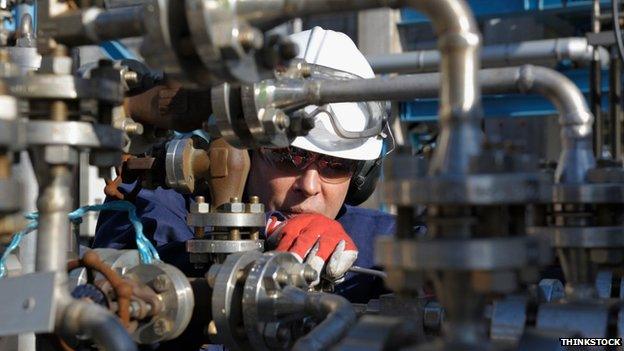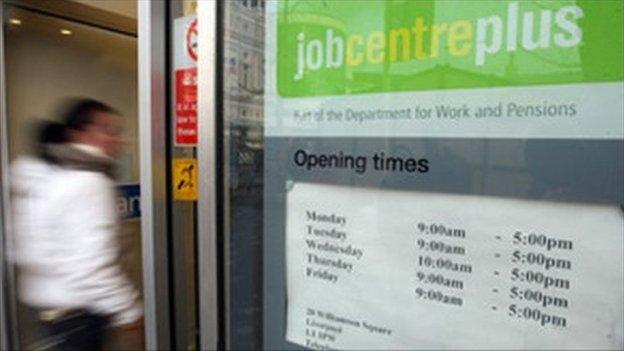Firms 'hit by oil downturn', Bank of Scotland report says
- Published

The report suggested the downturn in the oil and gas sector may have contributed to the fall in new work
The downturn in the oil and gas sector contributed to a marked fall in new business for Scottish companies last month, according to a report.
The Bank of Scotland said there was "marginal growth" in the Scottish private sector economy in February.
It followed a "weather-induced" month of contraction - the first in more than two years.
However, despite the decline in new work and "broad stagnation" of output, employment rose modestly in February.
The fall in incoming new business ended a 26-month run of growth, with some company purchasing managers indicating that the oil and gas industry downturn was having an "an adverse impact" on business performance.
The bank's Purchasing Managers' Index (PMI) improved to 50.2 last month - up from 47.7 in the previous month.
Any reading above 50 suggests expansion.
The report said both manufacturers and service providers recorded similarly weak increases in activity.
A number of companies said they were confident that demand would pick up in the coming months, and bolstered their payroll numbers.
However, growth was limited to the service sector, with manufacturers registering a marginal contraction in line with reports of reduced turnover and the non-replacement of leavers.
Input cost pressures continued to weaken during February, with the rate of cost inflation the lowest recorded in nearly six years.
Moreover, manufacturers signalled a drop in input prices for a second successive month, and the sharpest recorded fall since June 1999.
Bank of Scotland chief economist Donald MacRae said: "This month's PMI suggests the Scottish economy has regained some but not all of the growth momentum lost at the beginning of the year."
Cost deflation
Meanwhile, a report by business advisers BDO found firms were seeing overall cost deflation for the first time since 2009.
Its latest Business Trends report also found business confidence and companies' hiring intentions remained high.
Martin Gill, head of BDO in Scotland, said: "Businesses are well placed to take advantage of falling costs, to help them to bed in growth.
"Lower input prices will help entrench the recovery, as consumers gain more spending power.
"However, the economy still has substantial spare capacity. Spending on infrastructure is one of the most effective ways to push the economy back toward full employment and keep the recovery on track."
'Positivity up'
A separate report by the Federation of Small Businesses (FSB) has suggested that small Scottish firms are less confident than they were at this point in 2014.
However, business confidence is higher than at the end of last year, with two-in-five firms expecting prospects to improve over the next three months.
FSB Scottish policy convener Andy Willox said: "Scottish small business owners have recaptured some, but not all, of the positivity they had at the start of last year.
"We recognise that lower, positive confidence levels across the UK probably signal a return to steadier conditions. But we're still concerned to see Scottish confidence tracking behind the UK average."
He added: "Although causing issues in certain sectors, the low oil price seems to be having an overall positive impact on small firms.
"When revenues are down, it is even more important to keep running costs under control."
Earlier this month a leading economic forecaster said the Scottish economy would continue to pick up pace, despite the lower oil price having an adverse impact on the oil and gas industry.
The Fraser of Allander Institute argued that the boost to oil users in Scotland outweighed the harm to North Sea producers.
- Published4 March 2015

- Published18 February 2015

- Published9 February 2015
